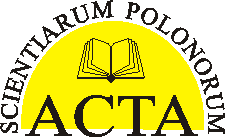Title
EFFECT OF POTASSIUM FERTILIZATION ON YIELD, GROWTH AND CHEMICAL COMPOSITION OF BASIL HERB
Autor
Katarzyna Dzida, Zenia Michałojć, Zbigniew Jarosz, Karolina Pitura, Natalia Skubij
Keywords
Ocimum basilicum, potassium, biological value, macro-nutrients
Abstract
In the cultivation of herbal plants, besides the size of the crop, the quality of obtained raw material is extremely important, which is proven not only by the appearance and taste, but also biological value. Factors that affect these parameters include plant nutrition. The main nutrient affecting the correct course of metabolic processes in a plant is potassium. To obtain high yield in terms of quantity and quality, the nutritional requirements of plants must be met. The aim of the study was to determine the effect of potassium nutrition on the quality of basil herb. The experiment was established in a two-factor scheme, in which the factors were: potassium dose (0.5, 1.0, 1.5 g K·dm–3) and the type of potassium fertilizer (KCl, K2SO4, KCl + K2SO4). The yield of basil plants was influenced by the dose and type of potassium fertilizers used (0.5 g K·dm–3 – 92.5; 1.0 g K – 67.3; 1.5 g K – 69.75 g·plant–1). The highest content of L-ascorbic acid was found in basil plants fed with the average potassium dose (65.9 mg·100 g–1 FW). The least nitrates (V) were contained in basil fertilized with KCl in the highest dose of K (63 mg·100 g–1 FW). No effect of the dose and type of potassium fertilizer on the content of phosphorus and sulfur in the plant material, was recorded. The content of Ca and Mg was influenced by both the potassium dose and the type of potassium fertilizer. The most of these components was revealed by plants fed with KCl, and with the increase of the dose, the content of both these mineral components decreased. Chlorine content in the herb increased with the applied potassium dose, the effect on the concentration of chlorine in the plant material was exerted by the type of potassium fertilizer applied – the highest concentration of this element was recorded. The content of macroelements in the substrate from basil cultivation was influenced by the dose and type of potassium fertilizers used. The best quality parameters of basil were obtained after application of 1.0 g K·dm–3 substrate in the form of KCl + K2SO4.
Pages
135-145
Cite
Dzida, K., Michałojć, Z., Jarosz, Z., Pitura, K., Skubij, N. (2018). EFFECT OF POTASSIUM FERTILIZATION ON YIELD, GROWTH AND CHEMICAL COMPOSITION OF BASIL HERB. Acta Sci. Pol. Hortorum Cultus, 17(6), 135-145.
Full text


